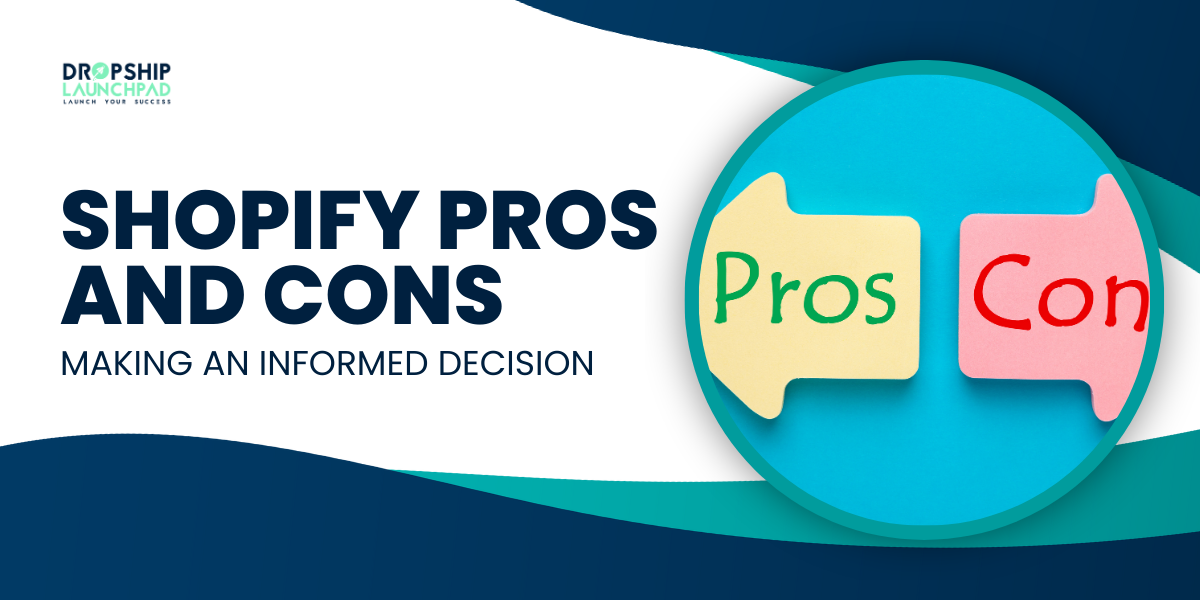Are you considering starting an online store? Look no further than Shopify, the all-in-one e-commerce platform that has been gaining popularity among entrepreneurs. Here, we’ll explore the pros and cons of using Shopify so that you can make an informed decision for your business.
First, let’s talk about the advantages of choosing Shopify. With its extensive app store, integrated point-of-sale system, and built-in marketing tools, Shopify provides a comprehensive solution to help you grow your business. It also offers versatile product selling options and simplified fulfillment processes.
However, it’s important to consider the limitations of Shopify as well. These include ongoing transaction fees, additional charges for non-Shopify payments, and limited free themes. We will delve into these drawbacks and in more detail in this blog.
By the end of this post, you’ll have a clear understanding of whether Shopify is the right choice for your e-commerce venture. So let’s get started!
What is Shopify, and why is it popular?
Shopify is an all-in-one e-commerce platform that allows businesses to create and run their online stores. It provides many features to help entrepreneurs build their brands, engage customers, and sell products effectively. Shopify has gained popularity for several reasons:
- User-friendly interface: Shopify is well known for its intuitive and easy-to-use interface, making it accessible for beginners with little to no technical knowledge.
- Customization options: The platform offers many themes and templates, allowing businesses to create visually appealing and unique online stores. External designers and developers can also utilize Shopify’s robust API to create custom solutions.
- Integrated payment gateways: Shopify integrates with over 100 payment gateways, making it easy for all businesses to accept payments from customers worldwide.
- App Store: The Shopify App Store provides a vast selection of free and paid apps to extend the functionality of your online store. These apps allow businesses to add features such as email marketing, customer reviews, and inventory management. Read Best Shopify Apps for Dropshipping in 2023
- Mobile-ready: With an increasing number of consumers shopping on mobile devices, Shopify ensures that online stores are optimized for mobile browsing and purchasing.
Read How does Shopify Work: Essential Information for 2023.
Importance of considering pros and cons before choosing Shopify.
Before committing to using Shopify, it’s vital to consider the pros and cons. Here are some reasons why considering pros and cons is essential:
- Tailoring to your specific needs: Every business is unique, and what works for one may not work for another. By evaluating the pros and cons, you can determine if Shopify offers the specific features and flexibility required for your business.
- Budget considerations: Different businesses have different budgets, and it’s essential to weigh the cost of using Shopify against the value it provides. Weighing the drawbacks and benefits might help you decide whether the platform is good or not.
- Scalability and growth potential: As your business evolves, you want to be sure that the chosen platform can accommodate your growth. By evaluating the pros and cons of Shopify, you can assess its scalability and whether it aligns with your long-term goals.
- Integration with existing systems: If you already have existing systems and tools in place, it’s crucial to consider whether Shopify can integrate seamlessly with them. Evaluating the pros and cons allows you to determine if there are any potential compatibility issues.
- Support and community: The level of support and the existence of a supportive community can greatly impact your experience with any platform. Considering the pros and cons helps you evaluate the available support options and the active Shopify community to ensure you have resources to rely on when needed.
Shopify Pros

Shopify offers several advantages that make it a top choice for aspiring entrepreneurs. Here are some of the pros of using Shopify as your e-commerce platform:
Easy to use and beginner-friendly platform
Shopify’s intuitive design is a major selling point. Whether you have prior experience with website development or not, Shopify makes it easy for anyone to set up and manage their online store. From creating product listings to managing inventory and processing orders, Shopify simplifies the entire e-commerce process and eliminates the need for technical expertise.
Wide range of customizable themes and templates
With Shopify, you have access to a wide selection of professionally designed themes and templates that can be customized to match your brand’s aesthetics. Whether you’re looking for a sleek and modern design theme or a more minimalist approach theme, Shopify offers a range of options to choose from. As a result, you may tailor your online store’s aesthetic to match the tone and personality of your company. Read Shopify Theme Store: Top 10 Picks for the Year.
All-inclusive E-commerce Platform
Shopify is an all-in-one e-commerce platform that provides everything you need to run a successful online store. From website hosting and domain registration to inventory management and order processing, Shopify handles it all. This eliminates the need for multiple third-party integrations and simplifies the overall management process.
Many built-in marketing and SEO tools
To help you promote your online store, Shopify offers a range of built-in social media marketing and SEO tools. These tools enable you to optimize your website for search engines, create discount codes and promotions, and integrate with popular social media platforms for increased visibility. With Shopify, you have the necessary tools to attract and retain customers effectively.
Secure and reliable hosting and payment options
Security and reliability are paramount to online transactions. Shopify provides secure hosting for your online store to ensure that your customers’ information is protected. Additionally, Shopify offers a range of trusted and integrated payment options.
Seamless integration with popular third-party apps and services
Shopify offers seamless integration with a wide range of third-party apps and services. This allows you to expand the functionality of your online store by integrating with various marketing tools, inventory management systems, analytics platforms, and more. With Shopify, you can customize your store’s features and capabilities to suit your specific needs.
Customer support
As an entrepreneur, it’s essential to have access to reliable customer support when you need it. Whether you have technical questions, need assistance with setting up your store, or have concerns about your business operations, Shopify’s support team is available to help you every step of the way.
Extensive App Store for Enhanced Functionality
Shopify’s App Store offers a wide range of applications and plugins that can enhance the functionality of your online store. From advanced inventory management tools to email marketing automation and sales analytics, the App Store provides numerous options to customize and optimize your store’s performance.
Integrated Point of Sale System
If you have a brick-and-mortar store or plan to sell products at physical locations, Shopify’s integrated point-of-sale (POS) system is a major advantage. The POS system allows you to seamlessly sync your online and offline inventory, track sales, and manage customer data all in one place. This integration provides a cohesive experience for both you and your customers. Read Shopify POS App: Top 5 to Pair With in 2023.
Built-in Advertising Tools
Shopify offers built-in advertising tools that empower you to effectively promote your products and drive traffic to your online store. Shopify equips you with everything you need to promote your business to the widest possible audience, from social media ads to email marketing campaigns and Google Shopping connections.
Overall, Shopify offers a comprehensive e-commerce solution with a range of benefits that make it an excellent choice for entrepreneurs looking to build and grow an online store. From its user-friendly interface and customizable themes to its robust marketing tools and reliable customer support, Shopify provides the necessary tools and resources to help you succeed in the world of e-commerce.
Shopify Cons

While Shopify offers many advantages for e-commerce businesses, it’s important to consider the potential disadvantages before making a decision. Here are some potential cons of using Shopify:
Monthly subscription costs
One of the major drawbacks of using Shopify is the monthly subscription costs. Shopify offers different pricing plans, ranging from Basic to Advanced, with varying features and capabilities. While the Basic plan may be affordable for small businesses, the Advanced plan can be quite expensive, especially for businesses with high sales volumes. It’s important to carefully consider these costs and assess whether the provided features and benefits justify the price for your specific business needs.
Additional transaction fees for third-party payment providers
Shopify charges transaction fees for using third-party payment providers instead of their integrated payment gateway, Shopify Payments. The cumulative effect of these costs may reduce your earnings, especially if you have a high volume of transactions. It’s important to factor in these additional fees when calculating your overall costs and profitability on the platform.
Limited control over the backend code
While Shopify offers a user-friendly interface and a wide range of customizable themes, it does have limitations when it comes to coding and back-end customization. If you have specific requirements that go beyond the capabilities of the Shopify platform or if you have extensive coding knowledge and prefer full control over the back-end code, you may find Shopify’s limitations restrictive. However, for most e-commerce businesses, the available customization options should be sufficient to create a visually appealing and functional online store.
Competition from other Shopify stores
There is a lot of competition from other Shopify shops since Shopify is so widely used. This means that you’ll need to invest time and effort into differentiating your store and driving traffic to your website. It’s important to develop a strong marketing strategy and consider factors such as branding, product selection, and customer experience to stand out among the competition. Additionally, paying for third-party apps and marketing tools may be necessary to optimize your store’s performance and compete effectively.
While these potential cons should be considered, it’s important to note that Shopify remains one of the leading e-commerce platforms with a wide range of benefits and features. Ultimately, the decision to use Shopify should be based on your requirements, budget, and long-term objectives.
Utilizing Essential Shopify E-commerce Tools and Sales Features

Shopify offers a range of powerful e-commerce tools and sales features that can help make your business a success. Here are some key tools and features that Shopify provides:
- User-Friendly Interface: Shopify’s platform is designed to be user-friendly, making it easy for business owners to set up and manage their online stores. The interface is intuitive and provides a seamless experience for both beginners and experienced users.
- Mobile-Optimized: With the increasing popularity of mobile shopping, it’s crucial for your online store to be mobile-optimized. You can manage and keep an eye on your business from anywhere with Shopify, thanks to its mobile app and responsive designs.
- Payment Gateways: Shopify integrates with over 100 payment gateways, including popular options like PayPal and Stripe, making it easy for customers to make purchases on your website.
- SEO Tools: Shopify provides built-in SEO tools that can help improve your online store’s visibility in search engine results. You can optimize title tags, meta descriptions, and URLs to enhance your store’s ranking.
- Marketing and Promotion: Shopify offers various marketing and promotion tools, including discount codes, gift cards, and abandoned cart recovery. These features can help you attract and retain customers.
- Inventory Management: Managing inventory can be a complex task, but Shopify simplifies the process with its inventory management tools. You can track stock levels, set up automatic notifications for low stock, and manage your products with ease.
- Analytics and Reporting: Understanding your store’s performance is essential for making informed business decisions. Shopify provides analytics and reporting features that allow you to track sales, monitor traffic, and gain insights into customer behavior.
Shopify Pros and Cons: Analyzing the Pricing Options for Shopify
When considering a Shopify subscription, it’s important to understand the pricing options to determine which plan best suits your business needs. Here are the pricing tiers offered by Shopify:
- Basic Shopify: This plan is best suited for small businesses and startups. It has everything a beginner needs to get going with and grow an online store. The Basic Shopify plan costs $39 per month.
- Shopify: The standard Shopify plan offers additional features and tools to help businesses scale. It includes professional reporting and gift card functionality, among other advanced features. The Shopify plan costs $105 per month.
- Advanced Shopify: This plan is designed for businesses with high-volume sales and complex needs. It provides advanced features such as third-party calculated shipping rates and advanced report building. The Advanced Shopify plan costs $399 per month.
In addition to the basic pricing tiers, Shopify offers add-ons and extensions that can enhance your store’s functionality. These add-ons include additional payment gateways, marketing and sales tools, as well as premium themes for a customized look and feel.
It’s important to note that while Shopify provides a range of tools and features, there may be additional costs associated with certain functionalities. For example, using third-party apps or add-ons may require separate fees.
By carefully analyzing the pricing options and considering your business’s specific needs, you can make an informed decision about which Shopify plan is right for you.
Overall, Shopify offers a robust and user-friendly platform for building and managing your online store. Its array of features and tools, combined with its customizable pricing options, make it a popular choice for businesses of all sizes.
Factors to think about before committing to Shopify

When deciding whether to use Shopify for your e-commerce store, here are some key considerations to keep in mind:
- Budget: Consider your budget and determine if Shopify’s pricing plans and transaction fees align with your financial resources and expected sales volume.
- Design flexibility: Evaluate if Shopify’s customization options and templates allow you to create a visually appealing and unique online store that represents your brand effectively.
- Scalability: Consider your long-term growth plans and assess if Shopify can accommodate your anticipated increase in sales and traffic.
- Integration needs: Identify the specific apps and services you require to run your e-commerce store and check if Shopify offers integrations with those platforms.
- Technical expertise: Assess your level of technical expertise and determine if Shopify’s user-friendly interface and support resources are sufficient for your needs.
- Platform independence: Consider the potential impact of relying on a hosted platform like Shopify and evaluate if having more control over your website’s infrastructure is essential to you.
You can decide whether Shopify is the best option for your online store by giving serious thought to the aforementioned considerations.
Frequently Asked Questions About Shopify Pros and Cons
Are there any limitations or drawbacks to using Shopify as an e-commerce platform?
While Shopify is widely used for e-commerce, it has limitations. Customization options may be restricted compared to other platforms, and transaction fees can accumulate, particularly with third-party payment gateways. Advanced features often require extra apps or plugins, leading to increased expenses.
Can I integrate third-party apps and plugins with my Shopify store?
Absolutely! Shopify provides the flexibility to integrate third-party apps and plugins into your store. The Shopify App Store offers a diverse selection of apps and plugins to cater to different needs. Integrating these can greatly enhance your store’s functionality and features. Just make sure to carefully evaluate the compatibility and reliability of the apps before integrating them.
Does Shopify offer any built-in marketing and SEO features to help drive traffic to my online store?
Yes, Shopify provides built-in marketing, and SEO features to boost traffic to your online store. It includes SEO tools for optimizing meta tags, URLs, and alt tags. Shopify also integrates with popular marketing apps for email, social media, and content marketing. Their blogging platform helps drive organic traffic through SEO-friendly content.
What are the key advantages of using Shopify for an online store?
Shopify offers a user-friendly interface, customizable templates, secure hosting, and a range of integrations and apps to enhance your online store’s functionality. It’s easy to set up and manage, visually appealing, reliable and provides tools for payments, marketing, and inventory management.
Conclusion
For online stores, Shopify is a robust e-commerce platform with several advantages. Its all-inclusive nature, versatile product selling options, extensive app store, integrated point-of-sale system, and built-in marketing tools make it a top choice for many entrepreneurs.
Additionally, its simplified fulfillment and product sourcing processes and cost-effective plans for content creators further enhance its appeal.
However, it’s important to consider the limitations of Shopify as well. Ongoing transaction fees, additional charges for non-Shopify payments, costly apps for extended functionality, and challenging migration from Shopify are factors to keep in mind.
To make an informed decision about whether or not Shopify is the right platform for your business, weigh the Shopify pros and cons carefully.
For more details information, Read
- 2023’s top 10+ Shopify dropshipping themes to boost sales
- Dropshipping in 2023: Is Shopify still a good option?
- Prebuilt Shopify Store in 2022: Where to Buy [Without Money]
- Is Dropshipping Possible Worldwide in 2023?
- Developing Shopify Apps Made Easy: Expert Tips for Success
- High Ticket Dropshipping Niches Unleashed: Secret to Success

 Shopify Dropshipping Business Guide: The Ultimate Solution 2023
Shopify Dropshipping Business Guide: The Ultimate Solution 2023  Shopify: How do you accept Bitcoins (and other crypto payments)?
Shopify: How do you accept Bitcoins (and other crypto payments)?  10 Pro Tips to Fix Traffic but no Sales with Shopify Dropshipping
10 Pro Tips to Fix Traffic but no Sales with Shopify Dropshipping  Google Ads Conversion tracking on Shopify: How to set it up?
Google Ads Conversion tracking on Shopify: How to set it up?